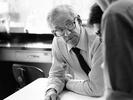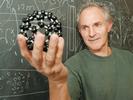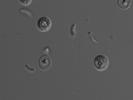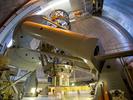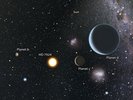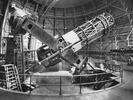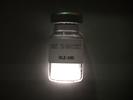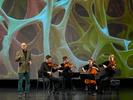Joe Palca appears in the following:
Tuesday, August 18, 2015
By
Joe Palca
If scientists can convince people to use the app, they hope it will help them solve a cosmic mystery. This story originally aired on March 27, 2015 on All Things Considered.
Friday, August 07, 2015
By
Joe Palca
Can a computer program craft passable prose — something readers can't distinguish from human-authored stuff? How about poetry, or dance mixes? New contests pose those challenges.
Monday, August 03, 2015
By
Joe Palca
The drug derived from the venom of cone snails must be injected into the spinal column to get beyond a patient's blood-brain barrier and bring relief. But scientists think they may have a workaround.
Monday, August 03, 2015
By
Joe Palca
Sometimes one person's insight transforms medicine. Dr. John Clements is one of those people. In the 1950s he discovered a slippery lung substance key to breathing, and to the survival of tiny babies.
Thursday, July 16, 2015
By
Joe Palca
Scientists have long wondered what's in the wispy cloud of gas floating in the space between the stars, absorbing starlight. Turns out it's a form of carbon named after architect Buckminster Fuller.
Wednesday, July 15, 2015
By
Joe Palca
Scientists have had a hard time finding the weak spots of Cryptosporidium parvum, but now that's changing. It's not a common killer in the U.S., but it's a different story in the developing world.
Tuesday, June 30, 2015
By
Joe Palca
Entrepreneurs are turning to Oak Ridge National Lab's supercomputer to make all sorts of things, including maps that are much more accurate in predicting how a neighborhood will fare in a flood.
Friday, June 12, 2015
By
Joe Palca
Scientists found a molecule crucial to perceiving the sensation of itching. It affects how the brain responds to serotonin, and may explain why anti-depressants that boost serotonin make some itch.
Monday, June 01, 2015
By
Joe Palca
First you get a crazy message from a friend. Then you get a not-so-crazy message that could help you find a job or fight a disease.
Saturday, May 16, 2015
By
Joe Palca
Shrinivas Kulkarni, an astronomy and planetary science professor at the California Institute of Technology, is a serious astronomer. But not too serious.
"We astronomers are supposed to say, 'We wonder about the stars and we really want to think about it," says Kulkarni — in other words, think deep ...
Wednesday, April 29, 2015
By
Joe Palca
Two new large planets have been found orbiting a nearby star. But what makes the discovery interesting is they were found using a telescope at an observatory that was slated to be shuttered.
Wednesday, April 29, 2015
By
Joe Palca
Using telescopes in Hawaii and California, astronomers have found two super-Earth-size planets orbiting a star a mere 54 light-years away.
This brings to three the total number of exoplanets around the star HD 7924.
The discovery is important for two reasons. NASA's Kepler telescope has shown that giant rocky ...
Saturday, April 25, 2015
By
Joe Palca
The Hubble Space Telescope this week celebrates 25 years in Earth's orbit. In that time the telescope has studied distant galaxies, star nurseries, planets in our solar system and planets orbiting other stars.
But, even with all that, you could argue that the astronomer for whom the telescope is named ...
Tuesday, April 21, 2015
By
Joe Palca
At the Oak Ridge National Laboratory in Tennessee, the future of manufacturing is taking shape. At the lab, 3D printers offer some unique design opportunities as well as interesting challenges.
Wednesday, April 08, 2015
By
Joe Palca
A modified venom from scorpions that carries a dye into the brain and makes tumors glow has cleared its latest hurdle. But will this attempt to improve brain surgery work in humans as well as animals?
Monday, March 30, 2015
By
Joe Palca
Two physicists keen to detect a a very rare, high energy particle think you and I can help. The researchers are working on an app that would allow any smartphone to detect rare particles from space.
Wednesday, March 25, 2015
By
Joe Palca
Current tests require growing anthrax in the lab, which isn't the best option for labs in Afghanistan. So engineers have come up with a credit-card-size test that could make the world a safer place.
Thursday, March 19, 2015
By
Joe Palca
Why are 20 tons of fossils being stored in the bell tower at the University of California at Berkeley? A look into the world's only paleontological collection that has its own carillon.
Monday, March 09, 2015
By
Joe Palca
Scientists in California report they are using the rapidly reproducing organism to track evolutionary changes. The twist is that the new work on evolution has implications for human cancers.
Monday, February 16, 2015
By
Joe Palca
Physicist Robert Davies worked with a classical quartet and two visual artists to create a musical performance about climate change. The music and images, he says, help the information take hold.


